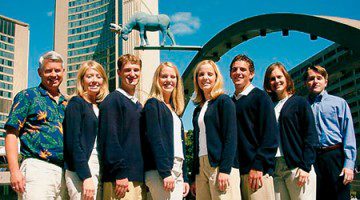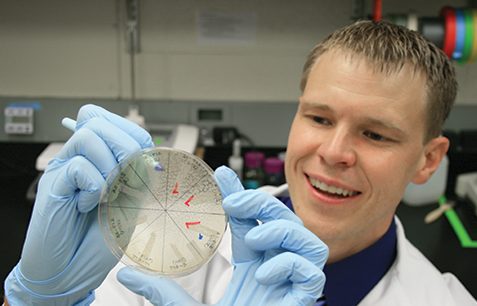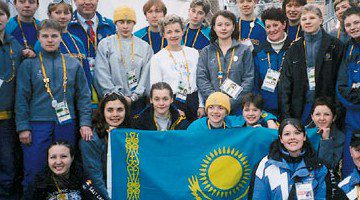By Shea N. Cutler
A young fan exited the BYU track field from which cheers, shouts, and loud speakers echoed. The words on the back of his shirt declared: “Let me win, but if I cannot win, let me be brave in the attempt–Special Olympics.”
For about 14 years BYU has hosted the Utah Special Olympics Summer Games, each year donating about $51,000 in facilities and support, more than half of the $100,000 required to run the games. Also, 90 percent of the management team for the three-day event and 30 percent of the volunteers are BYU students.
“We affect almost every department on campus when we come with our event,” said J.D. Donnelly, executive director of the Utah Special Olympics. “Everybody goes the extra mile to help support our special Olympians.
BYU donates the electricity, the sports equipment, the track, the field, and more. “These are the best facilities in the state in quality as well as in proximity,” said Tom Mullen, chairman of the board for Utah Special Olympics.
However, facilities are only nice to look at without the volunteers required to put them in use. Under the guidance of BYUSA student leaders, 2,000 volunteers crowd to the track field every summer to help the 1,100 athletes who come to participate in the games, the largest Special Olympics event held in Utah.
This spirit of volunteerism has been around since BYU began hosting the games. In the days when volunteers hosted special Olympians in their homes when they came to participate in the summer games, Mullen, then a BYU student, volunteered and an athlete named John stayed in his apartment.
John moved with the help of a walker, he had braces on both legs, and one of his arms was crippled. When John participated in the 50-meter run, the feat took him more than a minute.
“You and I could crawl the 50-meter faster than John finished. But John finished in second place,” Mullen recalled. They placed John on the winner’s stand. He bent over, and they draped a medal around his neck.
“He balanced himself with his one crippled hand on the walker, and with his one good hand, he raised his fist in the air, having accomplished something. He’s a whole different person now,” Mullen said. “Perhaps for the first time in his life, he learned that he could be a winner at something.”
Mullen, now an associate director of major gifts for BYU Development, has been involved with the games ever since he first volunteered 13 years ago.
“The thing about Special Olympics is once you volunteer and you’re with the special Olympians, they’ve got you. They just get inside your heart, inside your mind. You can never see a special Olympian again without feeling a warm tug at your heart and the need to somehow be involved,” he said.
The BYUSA-organized volunteers who have felt this need for involvement begin preparing nine months prior to the event each year. This year’s summer games director, Steve Bingham, a senior from Tremonton, Utah, majoring in recreation administration, has been in charge of large events before. As with many volunteers from BYU, however, this was his first time working with Special Olympics.
Those involved in Special Olympics in other states, where the same volunteers run the games year after year, stand in awe when they learn a group of “green” volunteers manage the games at BYU each year, Mullen said.
“I think it speaks to the quality of students that we have involved that we can have the students run this event like they do,” he said.
These students come as classes, as wards, and on their own to volunteer at the event. A programming and therapeutic recreation class, taught by S. Harold Smith, chair of the Department of Recreation Management and Youth Leadership, hosted the largest team at the summer games this year.
“It’s an opportunity for students to get to know and work with people with developmental disabilities and to feel more comfortable around those people,” Smith said.
“Most of us in the class just enjoy working with special populations,” said Jennifer Trainor, one of Smith’s students. “They’re so much fun! They just love us.”
Hosting Special Olympics at BYU provides a unique service opportunity, said BYU Student Life vice president Alton Wade, who officially opened the games this year.
“I believe Special Olympics plays a significant role in contributing to the well being of a very important part of our population,” Wade said. “Support of the Special Olympics program is consistent with BYUSA’s deep commitment to be involved in meaningful service.”
Because of such experiences and opportunities, Mullen thinks not only is BYU important to Special Olympics, but Special Olympics is important to BYU.
“Giving the students an opportunity to organize and to serve in this way helps them to put in perspective what we’re all about here at this university,” he said.
“If we leave this university with the thought in mind that the only reason we came to BYU was to learn how to earn money and to do things for ourselves, then we have taken a very narrow view. We could go anywhere to do that. We come here to this university to learn how to make a difference to mankind and to the Church.”









